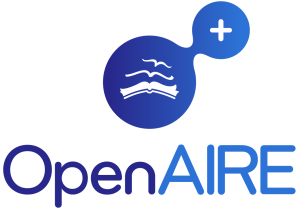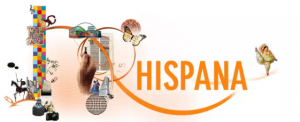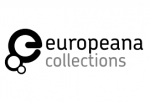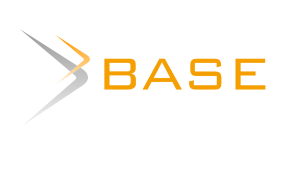Other relevant links
Collectors
RODIN participates in national and international projects increasing the visibility and impact of documents and their authors.
Project funded by 7PM (Séptimo Programa Marco de la Unión Europea) , OpenAIRE aims to support open access application in Europe. It provides the means to promote and realize the widespread adoption of the open access policy, as set out in the ERC Scientific Council Guidelines on open access and the open access pilot initiated by the European Commission. OpenAIRE has also launched a research data repository, Zenodo. FECYT is in charge of the implementation of the project in Spain, providing support and information so that Spanish repositories are compatible and their contents accessible from OpenAIRE.
OAISTER is a collective catalog of millions of records describing open access digital resources, collected from open access collections around the world using the Open Archivies Initiative Protocol for Metadata Harvesting (OAI-PMH) such as digital libraries, institutional repositories and online journals . It includes more than 25 million records from more than 1,100 participating institutions. It is accessible through OCLC FirstSearch and OCLC WorldCat.

The RECOLECTA portal (Collector of open science) is a joint initiative of the Network of University Libraries (REBIUN) and the Spanish Foundation for Science and Technology (FECyT) whose main objective is to promote the publication in open access of research works that are developed in the different Spanish academic institutions and facilitate their use and visibility while providing tools to facilitate the development of open access content.
Hispana brings together the digital collections of archives, libraries and museums in accordance with the Open Archives Initiative promoted by the European Union and fulfills in relation to Spanish digital repositories functions similar to those of Europeana in relation to European repositories, that is, it constitutes an aggregator of contents of the databases of digital collections. Among these collections, the institutional repositories of the Spanish universities and the digital libraries of the Autonomous Communities stand out, offering access to growing sets of all kinds of materials (manuscripts, printed books, photographs, maps …) of the Spanish bibliographic heritage.
Europeana is the European digital library, free access, created in 2008, which brings together contributions already digitized from recognized cultural institutions of the 28 Member States of the European Union. Its holdings include books, films, paintings, newspapers, sound files, maps, manuscripts, and other files, in 45 languages. It is the portal of European cultural heritage that contains about 60 million documents, contributed by some 2300 institutions made up of libraries, archives, galleries and museums.
BASE is one of the largest search engines for academic open access web resources. It offers access to more than 240 million documents from more than 8,000 sources, mainly repositories through the OAI-PMH protocol, with access to the full text of more than 60%. It is managed by the Bielefeld University Library.

Dialnet is one of the largest bibliographic portals in the world, whose main task is to give greater visibility to Hispanic scientific literature. It contains articles from magazines and monographs, theses, allowing access to the full texts of a significant number of them. Collaborative project started in 2001 at the University of La Rioja. It offers access to 270,000 theses, more than 117,000 in open access. All the theses included in RODIN are accessible from Dialnet.
Dart- Europe is the European thesis portal in digital format. It is in charge of collecting the metadata of the doctoral and master thesis through the OAI-PMH protocol, provided that they are freely accessible and that they can be freely downloaded, read and used. A large number of Universities participate in the project by contributing their databases. It is administered by University College London.
OATD (Open Access Theses and Dissertations) is a specific international repository of doctoral theses that gives access to theses from all over the world in open access. It was launched in April 2013 and currently collects metadata from more than 600 universities and research institutions and indexes around one and a half million theses.
Search engine specialized in scientific and academic literature. The assignment of metadata to documents and the use of the Open Archives Initiative (OAI-PMH) protocol allows the recovery of works deposited in RODIN in Google scholar, which retrieves journal articles, technical reports, theses, books and other documents considered from academic content, ranking among the first search results. Google’s ranking technology takes into account the full text of each article, as well as the author, where it was published and how often it has been cited in other specialized sources.
Relevant links
Sources of information on editorial policies, repositories directories and resources of interest on open access.
Sherpa/Romeo is the key database of open access editorial policies, based at the University of Nottingham, used worldwide by repository administrators and academics to check their self-archiving rights for their publications. Provides information on international magazine publications. There is currently a new version that has modernized its design and continues to collect the same information, but now it is distributed in three tabs with information on each version of the article (submitted, accepted and published). Each version can have one or more open publishing pathways. In addition, a predictive search engine has been incorporated and the classification of journals by color has been withdrawn based on their open access policy.
Dulcinea is a project whose objective is to know the editorial policies of Spanish journals regarding access to their files, their copyright rights and how these may affect their subsequent self-archiving in institutional or thematic repositories. Magazines are classified by color following the Sherpa / ROMEO taxonomy.
La Open Archives Initiative (OAI) develops and promotes interoperability standards that facilitate the dissemination, exchange and access to heterogeneous collections of scientific and academic documents. To achieve this, they designed the OAI-PMH (protocol for the collection of metadata). There are currently more than 300 institutional repositories registered with the Open Archives Initiative.
OAD (Open Access Directory) is a wiki in which the main questions about open access to scientific information are collected, maintained by the Open Access Community in general. It includes a list of Repositories by disciplines and Data Repositories.
ROAR is a directory of open access repositories, maintained by the University of Southampton in the United Kingdom, where more than 4000 repositories can be located, organized by geographical origin, type of software used or by the type of documents it houses. It also contains links to other added services such as growth statistics from institutional repositories.
OpenDOAR is a directory of open access institutional repositories from around the world, created and maintained by the University of Nottingham. It allows the search of more than 2800 repositories and the joint search in the full-text contents included in them.
The objective of Busca Repositorios is to offer the landscape of the repositories of academic, research and cultural institutions existing in Spain. The repositories that are mentioned are registered in ROAR, or OpenDOAR, in the list of data providers of the Open Archive Initiative or have been made public by their creators.
Melibea is a directory of policies in favor of open access to scientific production with the aim of identifying and analyzing existing policies, nationally and internationally, that favor, promote or require open access to information and documentation generated by researchers and professors of institutions public, whose research is, totally or partially, financed with public funds.
Creative Commons is an American non-profit organization that has developed a set of “model licensing contracts” or copyright licenses (Creative Commons licenses or “CC” licenses) that offer the author of a work a simple and standardized way of grant permission to the general public to share and use your creative work under the terms and conditions of their choice. Creative Commons licenses do not replace copyrights, but rather rely on them to allow you to modify the terms and conditions of the license of your work in the way that best meets your needs..
The institution affiliated with Creative Commons Spain is the University of Barcelona (UB), which in 2004 adapted the licenses to the Spanish and Catalan legislation on intellectual property in the Spanish State.
ORCID (Open Researcher & Contributor ID) is an international non-profit organization that provides an identifier based on ISO 27729: 2012, Information and documentation – International Standard Name Identifier (ISNI), which allows researchers to have a persistent and unambiguous author code to clearly distinguish his academic production. This initiative aims to guarantee the unequivocal distinction of the academic production of researchers and to be an effective method to be able to link the research activities referenced in different information systems.
For more information contact ![]() repositorio.digital@uca.es
repositorio.digital@uca.es








